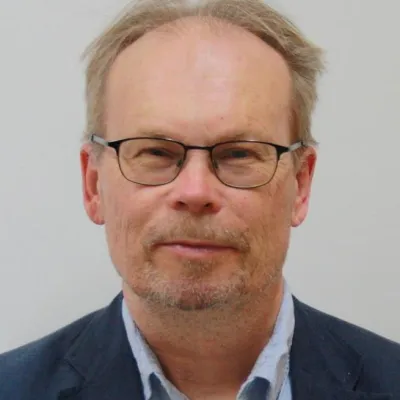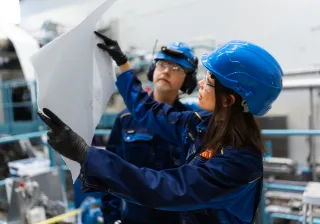Close strategic cooperation with VTT supported Neste in strengthening its position as the world’s leading producer of sustainable aviation fuel and renewable diesel. Both parties have boosted their expertise in catalytic processes required for the treatment of bio-based raw materials.
Key facts
Neste needed to increase its R&D efforts in catalytic processes to replace fossil-based raw materials with renewable raw materials.
Neste and VTT signed a strategic agreement involving the installation of test equipment for hydrotreating renewable raw materials, consisting of several parallel reactors, and the development of related expertise.
The facility accelerated the testing of catalysts cost-efficiently. Choosing the correct catalyst for an industrial process can save up to tens of millions of euros annually.
Neste is the world’s leading producer of sustainable aviation fuel and renewable diesel. The company produces high-quality renewable fuels at its refineries in Finland, the Netherlands and Singapore – as well as through a joint operation in the US – entirely from renewable raw materials with an annual nameplate capacity of approximately 5.5 million tons. When completed, Neste’s Rotterdam refinery expansion project will further increase the company’s total production capacity of renewable products to 6.8 million tons annually in 2027.

Development of cleaner solutions requires extensive catalyst testing
Renewable raw materials derived, for example, from various waste and residue streams offer a path towards a circular economy and lower-emission alternatives to fossil fuels and other fossil-based products. Handling these bio-based feeds at the refinery requires a hydrogen treatment to remove impurities such as sulphur, nitrogen and oxygen, after which the feeds can be used as fuel or raw material for plastics.
In 2019, Neste identified the need to enhance the testing of catalysts so that they would better serve the expanding use of different types of renewable raw material streams. As VTT had made the decision to invest in a research environment for catalytic processes at its Bioruukki pilot centre, the companies agreed on a strategic partnership fostering the joint use and development of research infrastructures in Finland.
New research facility focused on bio-based raw materials
“Based on our long experience of working with VTT, we were happy to expand our research collaboration with a close and trusted partner. The partnership was a perfect fit, as the development of processes related to renewable fuels and chemical solutions has been central to both companies. Also, outsourcing the research facility for parallel catalyst testing was the most cost-efficient solution for us, and accelerated our development work considerably. As part of the agreement, Neste committed to utilising the services at VTT’s research environment, while VTT was able to use our new vehicle testing facility at our Porvoo site in Finland,” says Petri Lehmus, Vice President, Research and Development at Neste.
VTT’s research environment consists of parallel hydrotreating reactors, pre-treatment devices for various raw materials and catalysts, as well as analytics needed to monitor the process. The reactor unit is specifically designed to handle feeds of bio-based raw materials, such as tall oil fractions or plastic pyrolysis oil from recycled plastic.

Significant savings in time and money
According to VTT’s Antero Laitinen, Manager, Process Chemistry Development, VTT’s hydrotreatment equipment can help to significantly speed up the R&D process. Considering the economic benefits, selecting a more efficient catalyst provides opportunities for saving up to tens of millions of euros annually in a refinery.
“The four parallel reactor units and two separate feeding lines allow testing various industrial-size catalyst pellets on an accelerated schedule,” Laitinen notes, adding that the strategic cooperation has provided VTT with valuable learnings regarding handling and analysing various raw materials.
“We set out to strengthen Finnish expertise in the areas of bio-based and circular solutions, and I’d say VTT has been fortunate to learn from the best when working together with Neste. We’ve gained valuable know-how, for example, in industrial procedures and catalyst packaging,” Laitinen says.
Harri Latonen, Customer Account Lead at VTT adds that the cooperation is also a good example of how to make the best possible use of research facilities in the long-term.
“Having a shared or outsourced research environment is also part of risk management, allowing companies to test and pilot new materials, products and production processes without the need to invest in their own expensive equipment,” Latonen notes.

Commitment and continuity bring better results
During the project, VTT has provided Neste with:
Pioneering expertise in carbon-neutral technologies
World-class facilities and equipment at the Bioruukki pilot centre in Espoo, Finland
Close cooperation and continuity with a dedicated team throughout the project.
Neste’s R&D Manager Elina Harlin agrees it has been in both companies’ interest to increase the know-how in Finland related to catalytic processes and contribute to establishing a local competence cluster in the field. Regarding the collaboration with VTT, Harlin values the proactive problem-solving attitude of the researchers on the team.
“It’s important to have a partner like VTT that’s inspired by challenges. Also, I appreciate the fact that VTT was able to keep the same experts on the team throughout our cooperation. The commitment and continuity make it easier to deepen cooperation during the entire project,” Harlin concludes.

Process piloting and advanced upgrading of renewable and recycled materials








